
Updated Task Distribution Amongst Crew Members for Successful Shootings for 2024

Task Distribution Amongst Crew Members for Successful Shootings
When shooting a small-scale video, only one person handles all department workings. He or she works not only as a director, but also a cinematographer and the camera operator.
However, as the production grows and needs large-scale filming, more specific members are needed for different departments. Whether you want to set up a filming studio, or join a movie-making workshop, you’d better figure out the entire composition of the film crew and choose the best one according to your capabilities.
To simplify the scenario, we have divided the crew into these major departments, as shown below, with their work areas.
What Is the Role of a Producer?
The producer is the main handler of the filming. Before filming, he finds out the content and directions and links with the director and DP for each direction to get the best vision of the music video. The producer are responsible for:
1. Schedule the crew members
Producers can make the call sheets for the crew members to maintain their schedule according to the specific timelines.
2. Find the studio space
To find the studio space, the producers work with the directors to get the exact location according to the script of their music video for better illustrations.
3. Find the gear
Producers found the gear for the studio space and handled the renting of the equipment from the warehouse.
4. Build relationships with the industries
If the filming is starting and you don’t know who to choose, you should build a relationship with the appropriate people in the industry. So that when you are in trouble, you can call them off to get the solution.
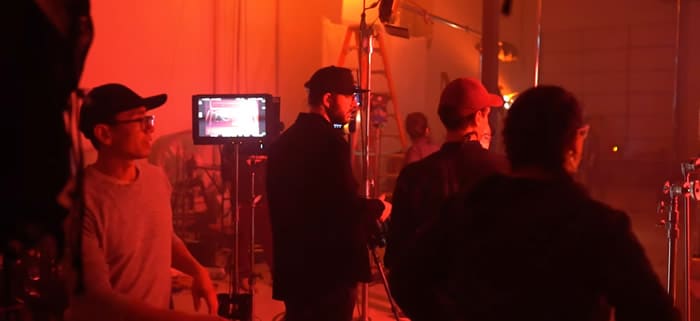
Roles of a Director Department
The director is considered to be in charge of filmmaking. His main responsibility is creatively giving the idea to the production and communicating to the crew and characters to check out what they want in their scenes to play out.
The director department mainly consists of the director and the first assistant director, and sometimes there is a 2nd, a 3rd, and 4th AD. For example,
1st AD
The first lead is mainly in charge of time management, communicate with the crew member, and ensuring that the shorts get done safely and readily.
![]()
Note: If there is no dialogue in the shorts, then the director usually gives reference pictures of the scenes and moods to act in that way.
You need to work with different people in the industry to check their personalities and work according to them. There is no need to work with the same people repeatedly.
Team for Production Designing
The next and foremost department is the production design. In this the production designer is the leader of all and has to work with the art director. He is mainly in charge of the set builders, set dressers, prop makers, hair and makeup, and costume and wardrobe departments.
In this department, the production designer is mainly involved in decorating the sets, making props, and setting up the lighting.
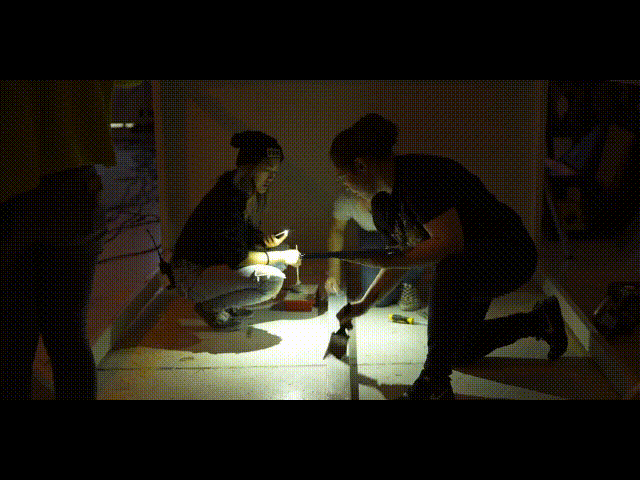
Cinematographers Department
The cinematic department comes to the frontline to give the shots and the lit music video final touches. In this, the head of the department is also known as the director of photography.
Director of photography
He mainly decides how the shots and the music video footage look. The main action is to handle the lightning and interact with the lights with the environment and the characters. He should build relationships with each other for better illusions.
Director’s monitor
The director’s monitor is the screen that displays a live shoot and filming of everything happening on camera. It mainly gives each take’s exact position and views for coordinating with the director and the DP.
Due to this, they can change the direction and the setup wherever they want and whenever they want.
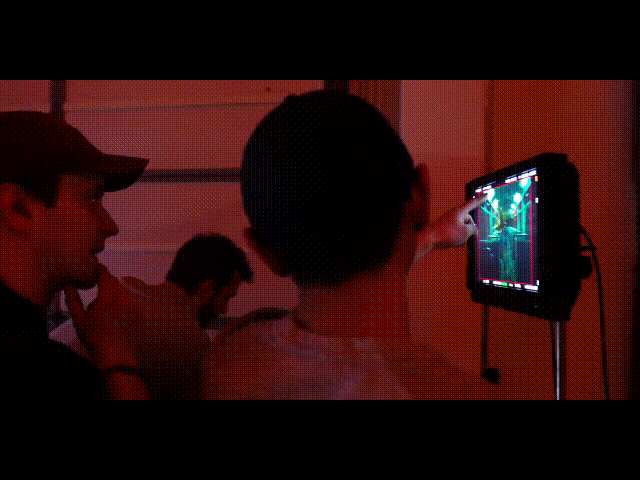
Camera operators
To operate the camera, the DPs are not involved, but there is a specific job of the camera operators, which handle the shots and moves according to the director’s directions. There are also 1st and 2nd Assistant Cameras (AC) with the camera operators.
1st Assistant Camera
The duty of the 1st AC is to focus on the required target, pulling, swapping the lenses from the camera. He is ensuring that the camera is all set and workable on the shoot day without any trouble.
2nd Assistant Camera
The 2nd AC has to consider the slates of the shots, place exact locations and markers for the characters, and give exposed footage to save for the backup.
Gaffers and key grip
Gaffers and key grip have their own teams for maintaining the lighting and grip work assigned by the DP according to the creative plans.
Digital media technician
It is essential to get the backup of footage of every shot. If you are working on a large scale, the backup planner is recognized as the Digital Media Technician (DMT).
DMT will handle the exposed footage, which Digital Memory Card will do with tapes denoting the card’s number. Make sure to make two backups of the footage to prevent any trouble.

![]()
Note: Making two copies for the backup will reduce the risk of corrupted files and physical accidents of losing the footage.
Additional Roles
If you are the music video director, you need a Cinematographer with Camera Operators. He will be in charge of pulling and adjusting all the camera alignments. If you have enough budget, go with the co-producer to help you direct the talents.
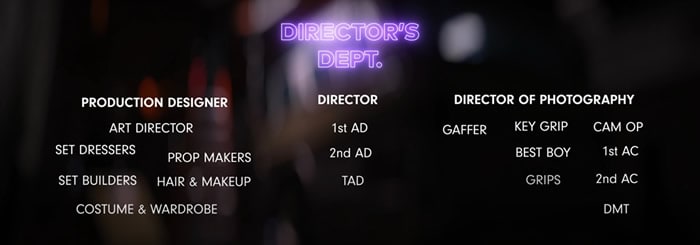
To make your subject looks good and modern according to the theme, you should hire hair and makeup artist. If you have more budget, you can do it professionally with more and more crew members.
Conclusion
If you are a starter, then there is no need to worry to pull-off all the roles in a crew; you just need two to three people for the start-up. That’s all about the large production, but whenever you scale up, you should know how to manage all the members with their required areas.
You need to work with different people in the industry to check their personalities and work according to them. There is no need to work with the same people repeatedly.
Team for Production Designing
The next and foremost department is the production design. In this the production designer is the leader of all and has to work with the art director. He is mainly in charge of the set builders, set dressers, prop makers, hair and makeup, and costume and wardrobe departments.
In this department, the production designer is mainly involved in decorating the sets, making props, and setting up the lighting.

Cinematographers Department
The cinematic department comes to the frontline to give the shots and the lit music video final touches. In this, the head of the department is also known as the director of photography.
Director of photography
He mainly decides how the shots and the music video footage look. The main action is to handle the lightning and interact with the lights with the environment and the characters. He should build relationships with each other for better illusions.
Director’s monitor
The director’s monitor is the screen that displays a live shoot and filming of everything happening on camera. It mainly gives each take’s exact position and views for coordinating with the director and the DP.
Due to this, they can change the direction and the setup wherever they want and whenever they want.

Camera operators
To operate the camera, the DPs are not involved, but there is a specific job of the camera operators, which handle the shots and moves according to the director’s directions. There are also 1st and 2nd Assistant Cameras (AC) with the camera operators.
1st Assistant Camera
The duty of the 1st AC is to focus on the required target, pulling, swapping the lenses from the camera. He is ensuring that the camera is all set and workable on the shoot day without any trouble.
2nd Assistant Camera
The 2nd AC has to consider the slates of the shots, place exact locations and markers for the characters, and give exposed footage to save for the backup.
Gaffers and key grip
Gaffers and key grip have their own teams for maintaining the lighting and grip work assigned by the DP according to the creative plans.
Digital media technician
It is essential to get the backup of footage of every shot. If you are working on a large scale, the backup planner is recognized as the Digital Media Technician (DMT).
DMT will handle the exposed footage, which Digital Memory Card will do with tapes denoting the card’s number. Make sure to make two backups of the footage to prevent any trouble.

![]()
Note: Making two copies for the backup will reduce the risk of corrupted files and physical accidents of losing the footage.
Additional Roles
If you are the music video director, you need a Cinematographer with Camera Operators. He will be in charge of pulling and adjusting all the camera alignments. If you have enough budget, go with the co-producer to help you direct the talents.

To make your subject looks good and modern according to the theme, you should hire hair and makeup artist. If you have more budget, you can do it professionally with more and more crew members.
Conclusion
If you are a starter, then there is no need to worry to pull-off all the roles in a crew; you just need two to three people for the start-up. That’s all about the large production, but whenever you scale up, you should know how to manage all the members with their required areas.
Contemporary Voiceover Practices for Dynamic Video Creation - An Updated Guide
How to Record & Add Voiceover to Videos

Liza Brown
Mar 27, 2024• Proven solutions
Have you ever wanna add your own voice to video , make a voice over demo for uploading and sharing on social network sites or create a documentary for some important stuff? You can do this as long as you have nice video editing software like Wondershare Filmora Video Editor .
The voiceover function in Filmora video editing software allows you to record your own voice or add voice over file to video easily. You can custom the pitch, speed, and volume of the recorded voiceover, apply fade in and fade out effects as well. In this post, I’ll share how to record and add voiceover to a video with Filmora on your computer.
In Filmora, you can edit your video first and then record the voiceover after. Or, you can record the voiceover first and then edit the video around. In either way, you may need to prepare the script or an outline for smother recording.
Check the tutorial about How to Edit Audio in Filmora
Part 1: Record Voiceover and Add it to Video
In most cases, we recommend you to record the voiceover first so the sound will be more natural. In the following part, I’ll show you how to record Voiceover in Filmora.
1. Connect Microphone to Computer
Plug the microphone into your computer when you’re ready to get started. It’s better to use some professional external microphones to capture high quality sound.
2. Record voiceover
Installing Filmora on your computer, click the Wondershare Filmora icon to launch it. In the starting interface, click New Project to create a new one. Go to the Record tab, and then click “Record a Voiceover ” option to arouse the Record Audio windows.
Installing Filmora on your computer, click the Wondershare Filmora icon to launch it. In the starting interface, click New Project to create a new one. Go to the Record tab, and then click “Record a Voiceover ” option to arouse the Record Audio windows.
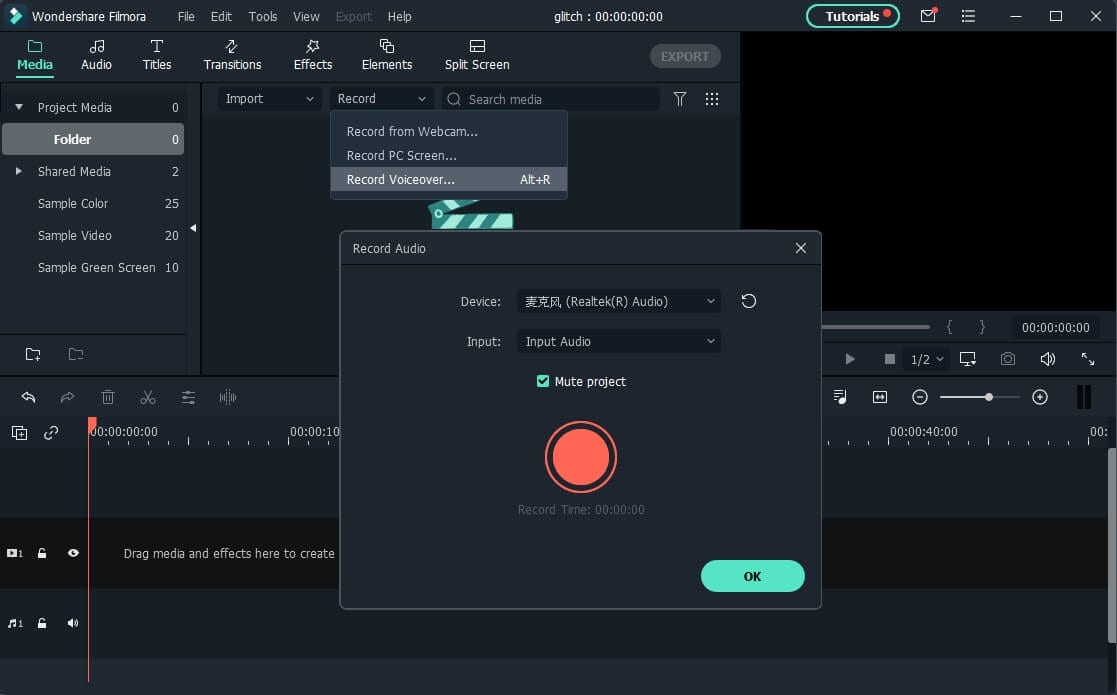
Or simply click the microphone icon and you will have 3 seconds of countdown to start speaking. When finished, click the microphone icon again. Then you will see a new Record file appearing on the audio track automatically.
3. Edit Recorded Voiceover to Video
To edit the recorded voiceover, click the it in the audio track and a new window will pop up for you to adjust audio settings, such as change the Speed, Volume, Pitch, etc. of the voiceover.
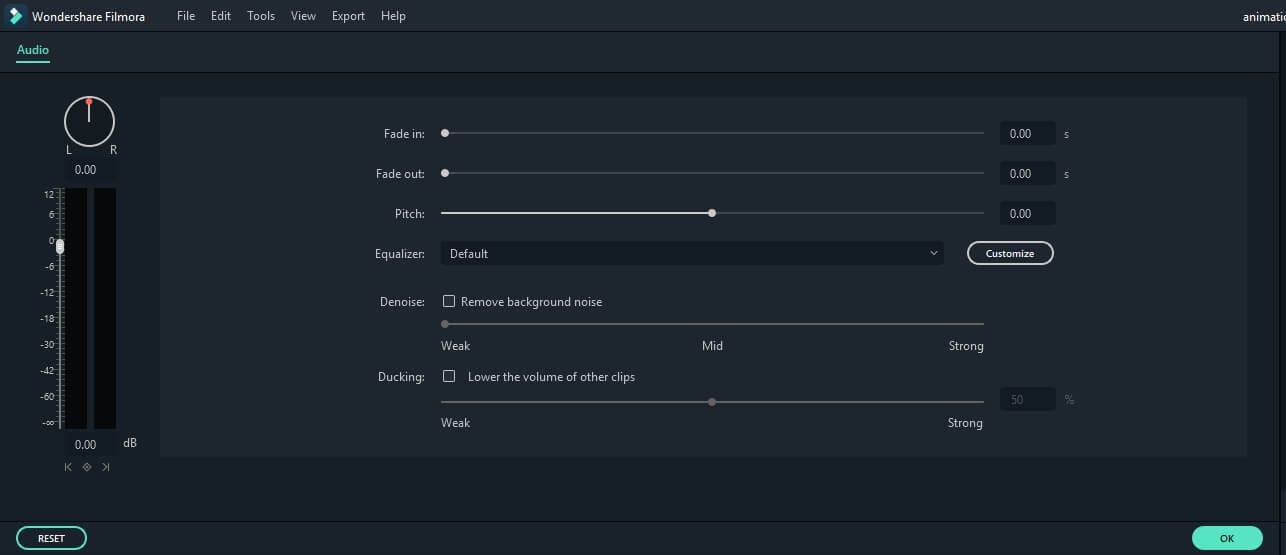
You can trim, cut out unwanted sound section from the recorded voiceover, or apply the fade in and fade out effect to the voiceover for smother transition.
Creative Audio Editing: How to Change the Recorded Voice
4. Sync Voiceover to Video
Now, it’s time to sync the recorded voiceover to video to make a video. Since Filmora supports up to 100 audio tracks, you can now add some background music to the voiceover as well.
Then import and drag-n-drop the video footage to the video track, drag and drop the sound track to the right position to fit your video. You can keep the audio and video track in the same length if needed.
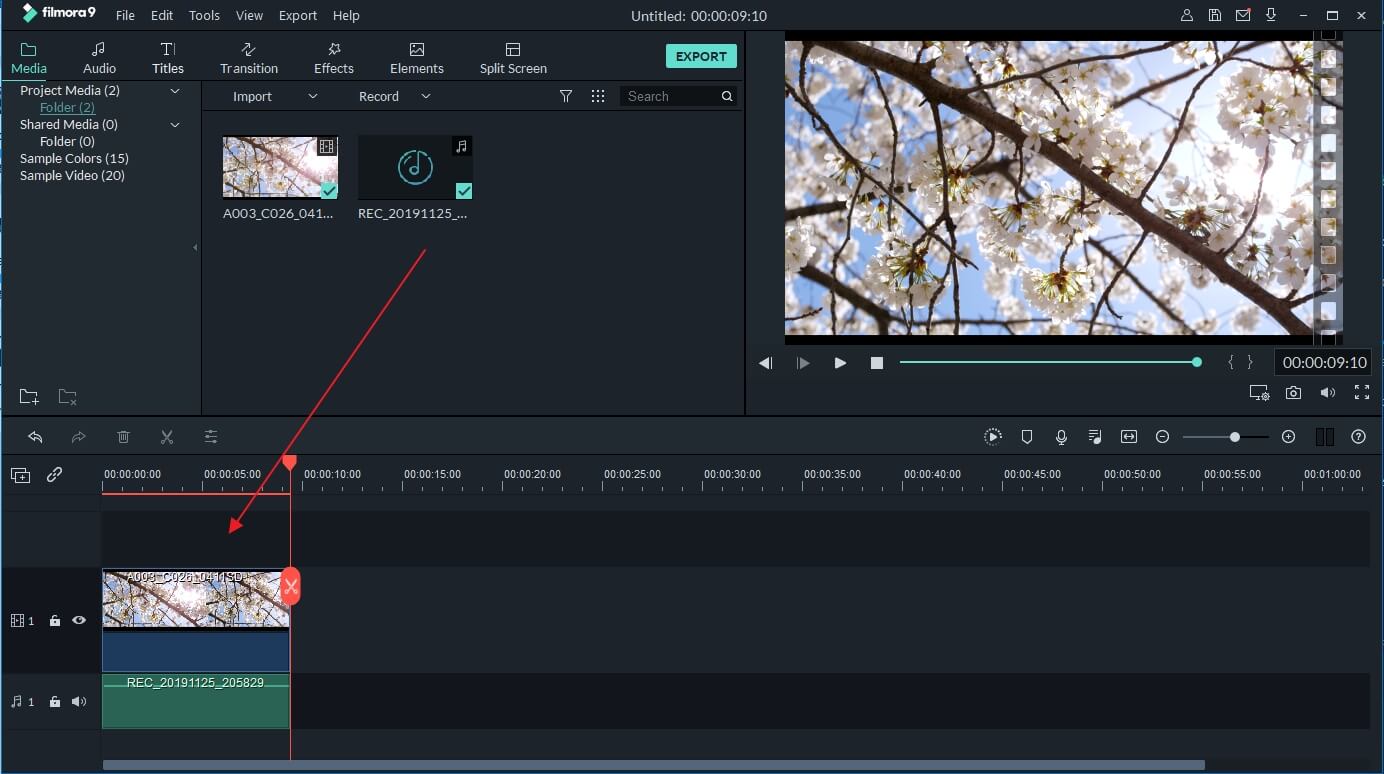
Note: If you’ve recorded the voiceover on your iPhone or other device already, and want to add it to the video, you can import it in the Project Library and then sync it to video.
To attract viewer’s attention, sometimes, you may need to add some titles or subtitles to emphasis the key points. Here is the detailed steps about how to add titles to video.
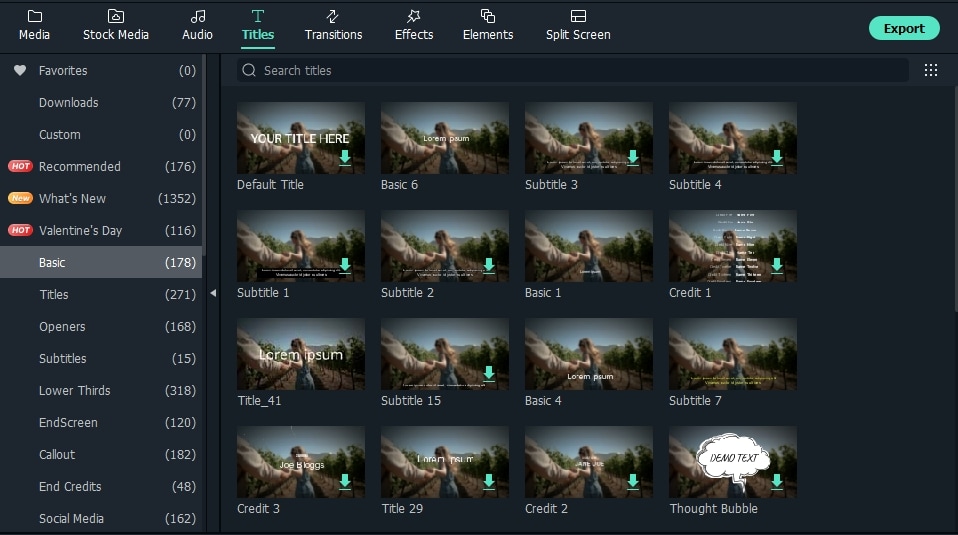
5. Export and save the new file
Check your video in the right previewing window. If you’re satisfied, click “Export” to export your new video file. You can either save the video to various formats or directly share it on YouTube and other social media platform. Moreover, you can even burn a DVD disk in minutes to watch it on TV.
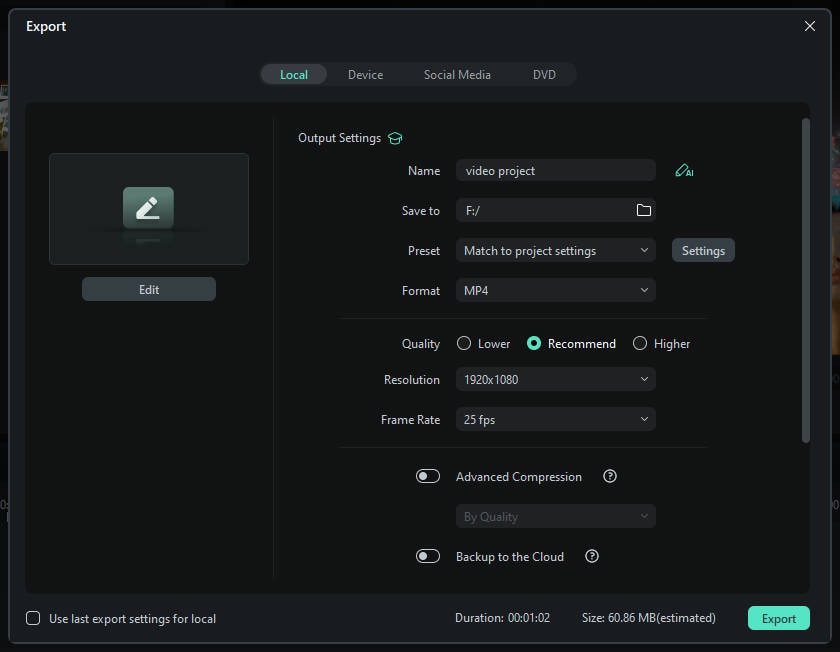
You see, with Wondershare Filmora video editor, it’s that easy to add a custom voiceover to video. Now master this feature and open a world of new possibilities for your video making!
Part 2: How to Record and Add Voiceover File during Video editing in Filmora
If you’ve recorded the voiceover on your iPhone or other device already, and want to add it to the video, you can follow the steps below:
1. Import the video to Filmora
After entering the Filmora main editing interface, click “Import” or drag and drop your video and voiceover file to the project library.
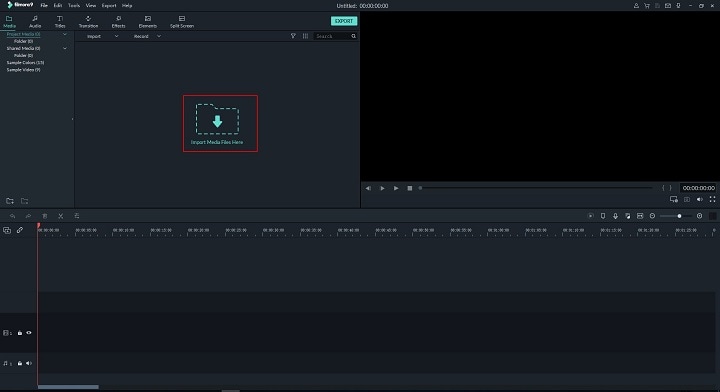
Filmora video editing software supports a vast range of formats, so you do not have to convert the files before importing. When all the files are imported, drag and drop them to the Video Timeline.
2. Record Voiceover in Video Editing
If you’re editng video and want to record voiceover in real time, you can also click the Record icon to start the recording.
Place the Playhead to the position where you need a voiceover, and then click the Microphone icon in the toolbar to start.
As before, the recorded voiceover will be added to the audio track automatically.
Note: To start a new record on the Timeline, you don’t need to close the dialog, just move the Time Indicator to another position and record a new voiceover.
3. Edit voiceover and Export
Just like what we said before, you can then edit the recorded voiceover to fit the video perfectly and then export it to your computer or upload to YouTube directly.
Filmora features more audio editing tools for improving the sound. Below is a video tutorial for applying fade in and out transition in Filmora. Download the trial version to test yourself.

Liza Brown
Liza Brown is a writer and a lover of all things video.
Follow @Liza Brown
Liza Brown
Mar 27, 2024• Proven solutions
Have you ever wanna add your own voice to video , make a voice over demo for uploading and sharing on social network sites or create a documentary for some important stuff? You can do this as long as you have nice video editing software like Wondershare Filmora Video Editor .
The voiceover function in Filmora video editing software allows you to record your own voice or add voice over file to video easily. You can custom the pitch, speed, and volume of the recorded voiceover, apply fade in and fade out effects as well. In this post, I’ll share how to record and add voiceover to a video with Filmora on your computer.
In Filmora, you can edit your video first and then record the voiceover after. Or, you can record the voiceover first and then edit the video around. In either way, you may need to prepare the script or an outline for smother recording.
Check the tutorial about How to Edit Audio in Filmora
Part 1: Record Voiceover and Add it to Video
In most cases, we recommend you to record the voiceover first so the sound will be more natural. In the following part, I’ll show you how to record Voiceover in Filmora.
1. Connect Microphone to Computer
Plug the microphone into your computer when you’re ready to get started. It’s better to use some professional external microphones to capture high quality sound.
2. Record voiceover
Installing Filmora on your computer, click the Wondershare Filmora icon to launch it. In the starting interface, click New Project to create a new one. Go to the Record tab, and then click “Record a Voiceover ” option to arouse the Record Audio windows.
Installing Filmora on your computer, click the Wondershare Filmora icon to launch it. In the starting interface, click New Project to create a new one. Go to the Record tab, and then click “Record a Voiceover ” option to arouse the Record Audio windows.

Or simply click the microphone icon and you will have 3 seconds of countdown to start speaking. When finished, click the microphone icon again. Then you will see a new Record file appearing on the audio track automatically.
3. Edit Recorded Voiceover to Video
To edit the recorded voiceover, click the it in the audio track and a new window will pop up for you to adjust audio settings, such as change the Speed, Volume, Pitch, etc. of the voiceover.

You can trim, cut out unwanted sound section from the recorded voiceover, or apply the fade in and fade out effect to the voiceover for smother transition.
Creative Audio Editing: How to Change the Recorded Voice
4. Sync Voiceover to Video
Now, it’s time to sync the recorded voiceover to video to make a video. Since Filmora supports up to 100 audio tracks, you can now add some background music to the voiceover as well.
Then import and drag-n-drop the video footage to the video track, drag and drop the sound track to the right position to fit your video. You can keep the audio and video track in the same length if needed.

Note: If you’ve recorded the voiceover on your iPhone or other device already, and want to add it to the video, you can import it in the Project Library and then sync it to video.
To attract viewer’s attention, sometimes, you may need to add some titles or subtitles to emphasis the key points. Here is the detailed steps about how to add titles to video.

5. Export and save the new file
Check your video in the right previewing window. If you’re satisfied, click “Export” to export your new video file. You can either save the video to various formats or directly share it on YouTube and other social media platform. Moreover, you can even burn a DVD disk in minutes to watch it on TV.

You see, with Wondershare Filmora video editor, it’s that easy to add a custom voiceover to video. Now master this feature and open a world of new possibilities for your video making!
Part 2: How to Record and Add Voiceover File during Video editing in Filmora
If you’ve recorded the voiceover on your iPhone or other device already, and want to add it to the video, you can follow the steps below:
1. Import the video to Filmora
After entering the Filmora main editing interface, click “Import” or drag and drop your video and voiceover file to the project library.

Filmora video editing software supports a vast range of formats, so you do not have to convert the files before importing. When all the files are imported, drag and drop them to the Video Timeline.
2. Record Voiceover in Video Editing
If you’re editng video and want to record voiceover in real time, you can also click the Record icon to start the recording.
Place the Playhead to the position where you need a voiceover, and then click the Microphone icon in the toolbar to start.
As before, the recorded voiceover will be added to the audio track automatically.
Note: To start a new record on the Timeline, you don’t need to close the dialog, just move the Time Indicator to another position and record a new voiceover.
3. Edit voiceover and Export
Just like what we said before, you can then edit the recorded voiceover to fit the video perfectly and then export it to your computer or upload to YouTube directly.
Filmora features more audio editing tools for improving the sound. Below is a video tutorial for applying fade in and out transition in Filmora. Download the trial version to test yourself.

Liza Brown
Liza Brown is a writer and a lover of all things video.
Follow @Liza Brown
Liza Brown
Mar 27, 2024• Proven solutions
Have you ever wanna add your own voice to video , make a voice over demo for uploading and sharing on social network sites or create a documentary for some important stuff? You can do this as long as you have nice video editing software like Wondershare Filmora Video Editor .
The voiceover function in Filmora video editing software allows you to record your own voice or add voice over file to video easily. You can custom the pitch, speed, and volume of the recorded voiceover, apply fade in and fade out effects as well. In this post, I’ll share how to record and add voiceover to a video with Filmora on your computer.
In Filmora, you can edit your video first and then record the voiceover after. Or, you can record the voiceover first and then edit the video around. In either way, you may need to prepare the script or an outline for smother recording.
Check the tutorial about How to Edit Audio in Filmora
Part 1: Record Voiceover and Add it to Video
In most cases, we recommend you to record the voiceover first so the sound will be more natural. In the following part, I’ll show you how to record Voiceover in Filmora.
1. Connect Microphone to Computer
Plug the microphone into your computer when you’re ready to get started. It’s better to use some professional external microphones to capture high quality sound.
2. Record voiceover
Installing Filmora on your computer, click the Wondershare Filmora icon to launch it. In the starting interface, click New Project to create a new one. Go to the Record tab, and then click “Record a Voiceover ” option to arouse the Record Audio windows.
Installing Filmora on your computer, click the Wondershare Filmora icon to launch it. In the starting interface, click New Project to create a new one. Go to the Record tab, and then click “Record a Voiceover ” option to arouse the Record Audio windows.

Or simply click the microphone icon and you will have 3 seconds of countdown to start speaking. When finished, click the microphone icon again. Then you will see a new Record file appearing on the audio track automatically.
3. Edit Recorded Voiceover to Video
To edit the recorded voiceover, click the it in the audio track and a new window will pop up for you to adjust audio settings, such as change the Speed, Volume, Pitch, etc. of the voiceover.

You can trim, cut out unwanted sound section from the recorded voiceover, or apply the fade in and fade out effect to the voiceover for smother transition.
Creative Audio Editing: How to Change the Recorded Voice
4. Sync Voiceover to Video
Now, it’s time to sync the recorded voiceover to video to make a video. Since Filmora supports up to 100 audio tracks, you can now add some background music to the voiceover as well.
Then import and drag-n-drop the video footage to the video track, drag and drop the sound track to the right position to fit your video. You can keep the audio and video track in the same length if needed.

Note: If you’ve recorded the voiceover on your iPhone or other device already, and want to add it to the video, you can import it in the Project Library and then sync it to video.
To attract viewer’s attention, sometimes, you may need to add some titles or subtitles to emphasis the key points. Here is the detailed steps about how to add titles to video.

5. Export and save the new file
Check your video in the right previewing window. If you’re satisfied, click “Export” to export your new video file. You can either save the video to various formats or directly share it on YouTube and other social media platform. Moreover, you can even burn a DVD disk in minutes to watch it on TV.

You see, with Wondershare Filmora video editor, it’s that easy to add a custom voiceover to video. Now master this feature and open a world of new possibilities for your video making!
Part 2: How to Record and Add Voiceover File during Video editing in Filmora
If you’ve recorded the voiceover on your iPhone or other device already, and want to add it to the video, you can follow the steps below:
1. Import the video to Filmora
After entering the Filmora main editing interface, click “Import” or drag and drop your video and voiceover file to the project library.

Filmora video editing software supports a vast range of formats, so you do not have to convert the files before importing. When all the files are imported, drag and drop them to the Video Timeline.
2. Record Voiceover in Video Editing
If you’re editng video and want to record voiceover in real time, you can also click the Record icon to start the recording.
Place the Playhead to the position where you need a voiceover, and then click the Microphone icon in the toolbar to start.
As before, the recorded voiceover will be added to the audio track automatically.
Note: To start a new record on the Timeline, you don’t need to close the dialog, just move the Time Indicator to another position and record a new voiceover.
3. Edit voiceover and Export
Just like what we said before, you can then edit the recorded voiceover to fit the video perfectly and then export it to your computer or upload to YouTube directly.
Filmora features more audio editing tools for improving the sound. Below is a video tutorial for applying fade in and out transition in Filmora. Download the trial version to test yourself.

Liza Brown
Liza Brown is a writer and a lover of all things video.
Follow @Liza Brown
Liza Brown
Mar 27, 2024• Proven solutions
Have you ever wanna add your own voice to video , make a voice over demo for uploading and sharing on social network sites or create a documentary for some important stuff? You can do this as long as you have nice video editing software like Wondershare Filmora Video Editor .
The voiceover function in Filmora video editing software allows you to record your own voice or add voice over file to video easily. You can custom the pitch, speed, and volume of the recorded voiceover, apply fade in and fade out effects as well. In this post, I’ll share how to record and add voiceover to a video with Filmora on your computer.
In Filmora, you can edit your video first and then record the voiceover after. Or, you can record the voiceover first and then edit the video around. In either way, you may need to prepare the script or an outline for smother recording.
Check the tutorial about How to Edit Audio in Filmora
Part 1: Record Voiceover and Add it to Video
In most cases, we recommend you to record the voiceover first so the sound will be more natural. In the following part, I’ll show you how to record Voiceover in Filmora.
1. Connect Microphone to Computer
Plug the microphone into your computer when you’re ready to get started. It’s better to use some professional external microphones to capture high quality sound.
2. Record voiceover
Installing Filmora on your computer, click the Wondershare Filmora icon to launch it. In the starting interface, click New Project to create a new one. Go to the Record tab, and then click “Record a Voiceover ” option to arouse the Record Audio windows.
Installing Filmora on your computer, click the Wondershare Filmora icon to launch it. In the starting interface, click New Project to create a new one. Go to the Record tab, and then click “Record a Voiceover ” option to arouse the Record Audio windows.

Or simply click the microphone icon and you will have 3 seconds of countdown to start speaking. When finished, click the microphone icon again. Then you will see a new Record file appearing on the audio track automatically.
3. Edit Recorded Voiceover to Video
To edit the recorded voiceover, click the it in the audio track and a new window will pop up for you to adjust audio settings, such as change the Speed, Volume, Pitch, etc. of the voiceover.

You can trim, cut out unwanted sound section from the recorded voiceover, or apply the fade in and fade out effect to the voiceover for smother transition.
Creative Audio Editing: How to Change the Recorded Voice
4. Sync Voiceover to Video
Now, it’s time to sync the recorded voiceover to video to make a video. Since Filmora supports up to 100 audio tracks, you can now add some background music to the voiceover as well.
Then import and drag-n-drop the video footage to the video track, drag and drop the sound track to the right position to fit your video. You can keep the audio and video track in the same length if needed.

Note: If you’ve recorded the voiceover on your iPhone or other device already, and want to add it to the video, you can import it in the Project Library and then sync it to video.
To attract viewer’s attention, sometimes, you may need to add some titles or subtitles to emphasis the key points. Here is the detailed steps about how to add titles to video.

5. Export and save the new file
Check your video in the right previewing window. If you’re satisfied, click “Export” to export your new video file. You can either save the video to various formats or directly share it on YouTube and other social media platform. Moreover, you can even burn a DVD disk in minutes to watch it on TV.

You see, with Wondershare Filmora video editor, it’s that easy to add a custom voiceover to video. Now master this feature and open a world of new possibilities for your video making!
Part 2: How to Record and Add Voiceover File during Video editing in Filmora
If you’ve recorded the voiceover on your iPhone or other device already, and want to add it to the video, you can follow the steps below:
1. Import the video to Filmora
After entering the Filmora main editing interface, click “Import” or drag and drop your video and voiceover file to the project library.

Filmora video editing software supports a vast range of formats, so you do not have to convert the files before importing. When all the files are imported, drag and drop them to the Video Timeline.
2. Record Voiceover in Video Editing
If you’re editng video and want to record voiceover in real time, you can also click the Record icon to start the recording.
Place the Playhead to the position where you need a voiceover, and then click the Microphone icon in the toolbar to start.
As before, the recorded voiceover will be added to the audio track automatically.
Note: To start a new record on the Timeline, you don’t need to close the dialog, just move the Time Indicator to another position and record a new voiceover.
3. Edit voiceover and Export
Just like what we said before, you can then edit the recorded voiceover to fit the video perfectly and then export it to your computer or upload to YouTube directly.
Filmora features more audio editing tools for improving the sound. Below is a video tutorial for applying fade in and out transition in Filmora. Download the trial version to test yourself.

Liza Brown
Liza Brown is a writer and a lover of all things video.
Follow @Liza Brown
Guide to Extracting Silent Version of an AVI File
How to Remove Audio from AVI

Shanoon Cox
Mar 27, 2024• Proven solutions
Got video with more than one audio track and want to remove the unnecessary one? Or want to extract audio, sound, or background music from home movies, YouTube videos, and any other video file? Well, what you need is an easy-to-use audio remover. This following article will introduce a step-by-step instruction on how to use powerful video editing software- Wondershare Filmora (originally Wondershare Video Editor) . With it, you can extract audio from video files like AVI, MP4, FLV, AVI, ect and save them in different for formats.
 Download Mac Version ](https://tools.techidaily.com/wondershare/filmora/download/ )
Download Mac Version ](https://tools.techidaily.com/wondershare/filmora/download/ )
1 Add the AVI file to the program
To get started using Wondershare Filmora (originally Wondershare Video Editor), download and install the program. Open the AVI you wish to edit in this video editing software. You can either drag and drop the file into the program or click “Import”. Then AVI file will appear in the media item near the preview pane.
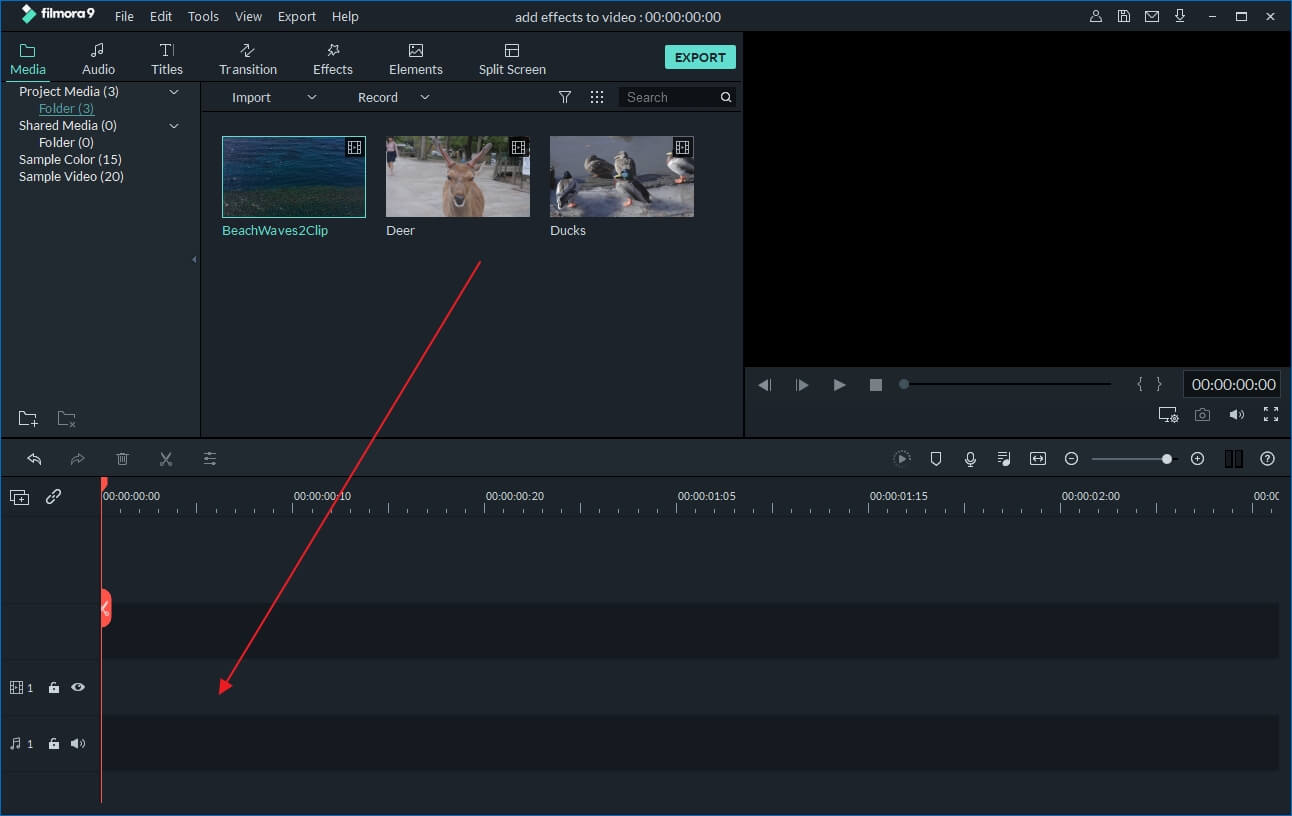
2 Remove the audio from AVI file
Then drag the AVI file into the Video Timeline to begin editing. Right click on the file and select “Audio Detach”. The audio will automatically appear on the Audio Timeline. Click on the audio track you wish to delete and press the “Delete” button on your keyboard. Alternately, you could right-click the track and select the “Delete” command.
Tip: If you want to add a new audio file to the video, just drag-n-drop it to the Audio Timeline. Then double click to edit it in the editing panel. You can change the playing speed, volume, pitch, etc. as you like. You can also hit “Record a voiceover” and plug in your microphone to record your own voice and add it to the video.
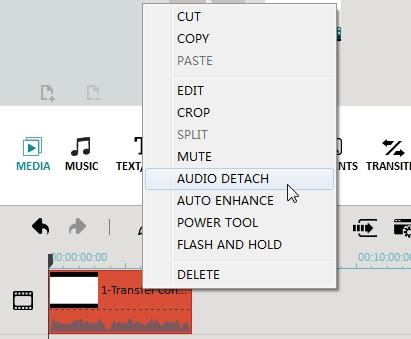
3 Save the new file
After that, press the Create button to save it to a suitable format. The process will take some time depending on the output file length and your computer performance. When extraction is over, find your file in the destination folder and play it using your media player. Of course, you can also directly upload the new file to YouTube or burn to DVD- all your choice!

 Download Mac Version ](https://tools.techidaily.com/wondershare/filmora/download/ )
Download Mac Version ](https://tools.techidaily.com/wondershare/filmora/download/ )
Now just follow the above detailed guide and easily remove audio from AVI or delete the unwanted sound track. Besides removing audio, you can also use Wondershare Filmora (originally Wondershare Video Editor) to split video , merge videos into one, rotate video , trim and crop video , add image to video, make multi screen video and more. Just download this ideal video editing tool and enrich your video life.
Here is a video tutorial:

Shanoon Cox
Shanoon Cox is a writer and a lover of all things video.
Follow @Shanoon Cox
Shanoon Cox
Mar 27, 2024• Proven solutions
Got video with more than one audio track and want to remove the unnecessary one? Or want to extract audio, sound, or background music from home movies, YouTube videos, and any other video file? Well, what you need is an easy-to-use audio remover. This following article will introduce a step-by-step instruction on how to use powerful video editing software- Wondershare Filmora (originally Wondershare Video Editor) . With it, you can extract audio from video files like AVI, MP4, FLV, AVI, ect and save them in different for formats.
 Download Mac Version ](https://tools.techidaily.com/wondershare/filmora/download/ )
Download Mac Version ](https://tools.techidaily.com/wondershare/filmora/download/ )
1 Add the AVI file to the program
To get started using Wondershare Filmora (originally Wondershare Video Editor), download and install the program. Open the AVI you wish to edit in this video editing software. You can either drag and drop the file into the program or click “Import”. Then AVI file will appear in the media item near the preview pane.

2 Remove the audio from AVI file
Then drag the AVI file into the Video Timeline to begin editing. Right click on the file and select “Audio Detach”. The audio will automatically appear on the Audio Timeline. Click on the audio track you wish to delete and press the “Delete” button on your keyboard. Alternately, you could right-click the track and select the “Delete” command.
Tip: If you want to add a new audio file to the video, just drag-n-drop it to the Audio Timeline. Then double click to edit it in the editing panel. You can change the playing speed, volume, pitch, etc. as you like. You can also hit “Record a voiceover” and plug in your microphone to record your own voice and add it to the video.

3 Save the new file
After that, press the Create button to save it to a suitable format. The process will take some time depending on the output file length and your computer performance. When extraction is over, find your file in the destination folder and play it using your media player. Of course, you can also directly upload the new file to YouTube or burn to DVD- all your choice!

 Download Mac Version ](https://tools.techidaily.com/wondershare/filmora/download/ )
Download Mac Version ](https://tools.techidaily.com/wondershare/filmora/download/ )
Now just follow the above detailed guide and easily remove audio from AVI or delete the unwanted sound track. Besides removing audio, you can also use Wondershare Filmora (originally Wondershare Video Editor) to split video , merge videos into one, rotate video , trim and crop video , add image to video, make multi screen video and more. Just download this ideal video editing tool and enrich your video life.
Here is a video tutorial:

Shanoon Cox
Shanoon Cox is a writer and a lover of all things video.
Follow @Shanoon Cox
Shanoon Cox
Mar 27, 2024• Proven solutions
Got video with more than one audio track and want to remove the unnecessary one? Or want to extract audio, sound, or background music from home movies, YouTube videos, and any other video file? Well, what you need is an easy-to-use audio remover. This following article will introduce a step-by-step instruction on how to use powerful video editing software- Wondershare Filmora (originally Wondershare Video Editor) . With it, you can extract audio from video files like AVI, MP4, FLV, AVI, ect and save them in different for formats.
 Download Mac Version ](https://tools.techidaily.com/wondershare/filmora/download/ )
Download Mac Version ](https://tools.techidaily.com/wondershare/filmora/download/ )
1 Add the AVI file to the program
To get started using Wondershare Filmora (originally Wondershare Video Editor), download and install the program. Open the AVI you wish to edit in this video editing software. You can either drag and drop the file into the program or click “Import”. Then AVI file will appear in the media item near the preview pane.

2 Remove the audio from AVI file
Then drag the AVI file into the Video Timeline to begin editing. Right click on the file and select “Audio Detach”. The audio will automatically appear on the Audio Timeline. Click on the audio track you wish to delete and press the “Delete” button on your keyboard. Alternately, you could right-click the track and select the “Delete” command.
Tip: If you want to add a new audio file to the video, just drag-n-drop it to the Audio Timeline. Then double click to edit it in the editing panel. You can change the playing speed, volume, pitch, etc. as you like. You can also hit “Record a voiceover” and plug in your microphone to record your own voice and add it to the video.

3 Save the new file
After that, press the Create button to save it to a suitable format. The process will take some time depending on the output file length and your computer performance. When extraction is over, find your file in the destination folder and play it using your media player. Of course, you can also directly upload the new file to YouTube or burn to DVD- all your choice!

 Download Mac Version ](https://tools.techidaily.com/wondershare/filmora/download/ )
Download Mac Version ](https://tools.techidaily.com/wondershare/filmora/download/ )
Now just follow the above detailed guide and easily remove audio from AVI or delete the unwanted sound track. Besides removing audio, you can also use Wondershare Filmora (originally Wondershare Video Editor) to split video , merge videos into one, rotate video , trim and crop video , add image to video, make multi screen video and more. Just download this ideal video editing tool and enrich your video life.
Here is a video tutorial:

Shanoon Cox
Shanoon Cox is a writer and a lover of all things video.
Follow @Shanoon Cox
Shanoon Cox
Mar 27, 2024• Proven solutions
Got video with more than one audio track and want to remove the unnecessary one? Or want to extract audio, sound, or background music from home movies, YouTube videos, and any other video file? Well, what you need is an easy-to-use audio remover. This following article will introduce a step-by-step instruction on how to use powerful video editing software- Wondershare Filmora (originally Wondershare Video Editor) . With it, you can extract audio from video files like AVI, MP4, FLV, AVI, ect and save them in different for formats.
 Download Mac Version ](https://tools.techidaily.com/wondershare/filmora/download/ )
Download Mac Version ](https://tools.techidaily.com/wondershare/filmora/download/ )
1 Add the AVI file to the program
To get started using Wondershare Filmora (originally Wondershare Video Editor), download and install the program. Open the AVI you wish to edit in this video editing software. You can either drag and drop the file into the program or click “Import”. Then AVI file will appear in the media item near the preview pane.

2 Remove the audio from AVI file
Then drag the AVI file into the Video Timeline to begin editing. Right click on the file and select “Audio Detach”. The audio will automatically appear on the Audio Timeline. Click on the audio track you wish to delete and press the “Delete” button on your keyboard. Alternately, you could right-click the track and select the “Delete” command.
Tip: If you want to add a new audio file to the video, just drag-n-drop it to the Audio Timeline. Then double click to edit it in the editing panel. You can change the playing speed, volume, pitch, etc. as you like. You can also hit “Record a voiceover” and plug in your microphone to record your own voice and add it to the video.

3 Save the new file
After that, press the Create button to save it to a suitable format. The process will take some time depending on the output file length and your computer performance. When extraction is over, find your file in the destination folder and play it using your media player. Of course, you can also directly upload the new file to YouTube or burn to DVD- all your choice!

 Download Mac Version ](https://tools.techidaily.com/wondershare/filmora/download/ )
Download Mac Version ](https://tools.techidaily.com/wondershare/filmora/download/ )
Now just follow the above detailed guide and easily remove audio from AVI or delete the unwanted sound track. Besides removing audio, you can also use Wondershare Filmora (originally Wondershare Video Editor) to split video , merge videos into one, rotate video , trim and crop video , add image to video, make multi screen video and more. Just download this ideal video editing tool and enrich your video life.
Here is a video tutorial:

Shanoon Cox
Shanoon Cox is a writer and a lover of all things video.
Follow @Shanoon Cox
Also read:
- [Updated] Expert Tips for Converting Your Favorite Videos Into Animated, Shareable GIFs
- [Updated] In 2024, Boost Your Photo Workflow in Windows 11
- [Updated] Unlocking Videos with a Click IOS Apps Rising in the Rankings on FB Downloader List for 2024
- Cookiebot-Enabled Lead Generation and Analytics
- Explaining Watermarks Securing Online Media
- In 2024, Budding Entrepreneurs Guide Mastering the Art of Social Media Advertising
- In 2024, Rhythm and Reel Leveraging Premiere Pro Features for Time-Synchronized Video Editing
- New 2024 Approved 5 Best Backwards Music Videos
- New 2024 Approved Fusion of Forms Innovative Methods for Merging Video with Sound ()
- New 2024 Approved Unveiling the Backbone of Music Techniques to Extract and Adapt Rhythmic Structures
- New In 2024, Advanced Voice Communication Technology for Gamers Interaction
- Title: Updated Task Distribution Amongst Crew Members for Successful Shootings for 2024
- Author: Jacob
- Created at : 2024-10-22 22:59:24
- Updated at : 2024-10-23 16:09:35
- Link: https://audio-shaping.techidaily.com/updated-task-distribution-amongst-crew-members-for-successful-shootings-for-2024/
- License: This work is licensed under CC BY-NC-SA 4.0.
